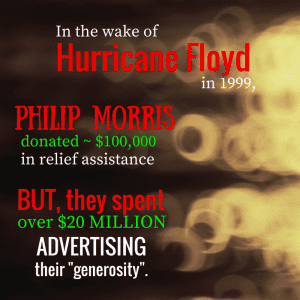Why charities should not let Big Tobacco use them for marketing.
Earlier this month, a journalist caused a stir among health charities by publicizing the fact that the American Red Cross accepts donations from the tobacco industry and allows the Red Cross symbol to be used on industry websites and vice-versa.

The immediate conversation is the tarnishing of the well-earned positive reputation of the Red Cross, which no doubt uses the money for good. The broader conversation is whether it is ever acceptable for a charity to accept voluntary donations from the tobacco industry.
For us here at ASH, and for many of our partners around the globe, the answer is a resounding “NO”. But people of good conscience can legitimately ask why. Why not use this ill-begotten money to do some good?
Here is the short answer: because it kills people. That is a bit glib, but let me explain.
The tobacco industry does not give to charity out of the goodness of its heart. If they had any heart at all, they would immediately cease their activities, since their products kill half of their long-term customers. For tobacco companies like Altria, donations are a part of marketing.
Altria and other cigarette makers know they have a lousy reputation. Boasting about their charitable giving introduces another side to the story, making it seem less black and white.
It gives cover to tobacco-friendly politicians, increasing the chances that tobacco industries get a seat at the table when health policy is discussed. And, in a world that is increasingly banning traditional forms of tobacco advertising, it is another way to get their name and brand out there, often in association with “good” organizations.
The “vector” of the global tobacco epidemic is the tobacco industry, and the way the disease is spread is through marketing. When a charity accepts tobacco money, it assists with tobacco marketing, and therefore helps spread the disease.
The incompatibility of tobacco money and the public interest has been widely recognized.
The International Federation of Red Cross and Red Crescent Societies stopped accepting tobacco donations years ago, and most national branches have followed suit. The World Health Organization and the United Nations agree. And this is a key aspect of the legally-binding WHO Framework Convention on Tobacco Control.
The only time that money acquired through selling tobacco can be used for good is when that money has been taken from tobacco companies against their will, whether through taxes, fines, or legal settlements.









